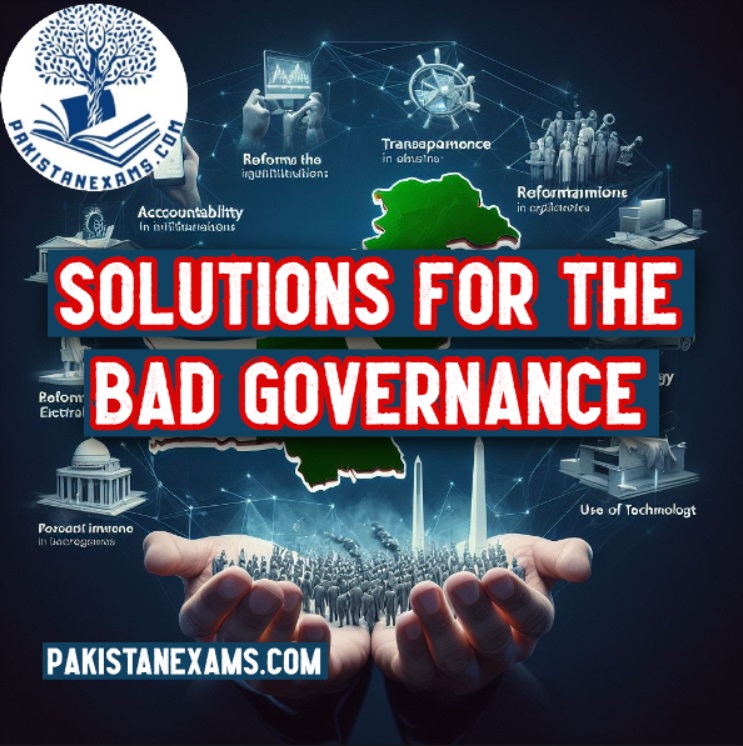Introduction
Pakistan needs to make a deliberate attempt to introduce comprehensive reforms across numerous institutions to combat the evil of bad governance. Reforming the electoral process, increasing accountability and transparency, implementing institutional reforms, and implementing AI, are important remedies for attaining good governance.
Reforms in Institutions
Instituting reforms in key institutions is paramount to combating bad governance in Pakistan. This involves several critical steps. First, we need to depoliticize state institutions, removing political influence so that they can function independently and serve the public without bias. Second, merit-based appointments are crucial. Instead of favoritism, appointments should be based on qualifications and skills, which ensures that only capable individuals lead these institutions. Third, we must focus on strengthening the autonomy of regulatory bodies. These bodies should have the power to make decisions without external pressure, which allows them to enforce rules effectively. Fourth, judicial independence is essential. The legal system should be free from political interference, ensuring fair trials and upholding justice. Fifth, empowering anti-corruption agencies is vital. Strengthening their authority helps curb dishonest practices. Finally, we need to streamline administrative processes and improve efficiency to ensure better service delivery to citizens. By fostering these institutional reforms, Pakistan can mitigate bad governance.
Click here to read about the causes of Bad Governance in Pakistan
Better Accountability and Transparency
Accountability and transparency are key elements of good governance, which are very important for fighting corruption and misconduct in Pakistan. This includes setting up strong systems of accountability to hold the people responsible for their actions and decisions. It can be achieved by having independent audit bodies, ombudsman offices, and whistleblower protection laws. Making it easier for people to access information and getting citizens more involved in how the country is run can also help make things more transparent and encourage public participation. Additionally, it is also crucial to make public officials declare their assets and to punish corruption very strictly to create a culture of honesty, transparency, and accountability.
Reforms in Electoral Process
Redesigning the electoral process to ensure free, fair, and transparent elections in Pakistan, is necessary to eradicate bad governance in the country. This calls for changes to strengthen the impartiality and independence of the election commission. Additionally, it assures fair representation and upholds the nation’s election integrity. Electoral fraud and manipulation can be reduced by taking steps like modernizing voter rolls, utilizing electronic voting machines, and strengthening control of campaign funding. Furthermore, building a democratic government requires advancing voter education, political inclusivity, and leveling the playing field for all political actors. This is how good governance can be achieved by reforming the electoral process.
Click here to read about the impacts of Bad Governance in Pakistan
Implementation of AI
Artificial Intelligence (AI) has the potential to significantly improve Pakistan’s governance issues in several ways. Firstly, AI can evaluate massive volumes of data to assist evidence-based policy development and enable data-driven decision-making. Secondly, AI-powered solutions can improve service delivery, automate routine tasks, and increase administrative efficiency. This lowers corruption and ensures the timely delivery of public services. Additionally, by keeping an eye on government operations, identifying irregularities, and spotting possible instances of corruption or misconduct, AI can advance accountability and transparency. Artificial intelligence (AI) technology, including chatbots and virtual assistants, can also improve democratic governance by facilitating citizen engagement through information access, communication with government institutions, and giving feedback. Last but not least, AI can help with outcome prediction, evaluation, and analysis of complicated policy challenges. Thus implementation of AI in governance can eradicate bad governance from Pakistan.
Conclusion
In summary, tackling the issues of poor governance in Pakistan necessitates a comprehensive approach that includes AI adoption, election process reforms, institutional reforms, and measures for accountability and transparency. It is possible to eradicate Pakistan’s bad governance and achieve good governance by giving priority to these remedies.


1 thought on “The Solutions for Bad Governance in Pakistan”